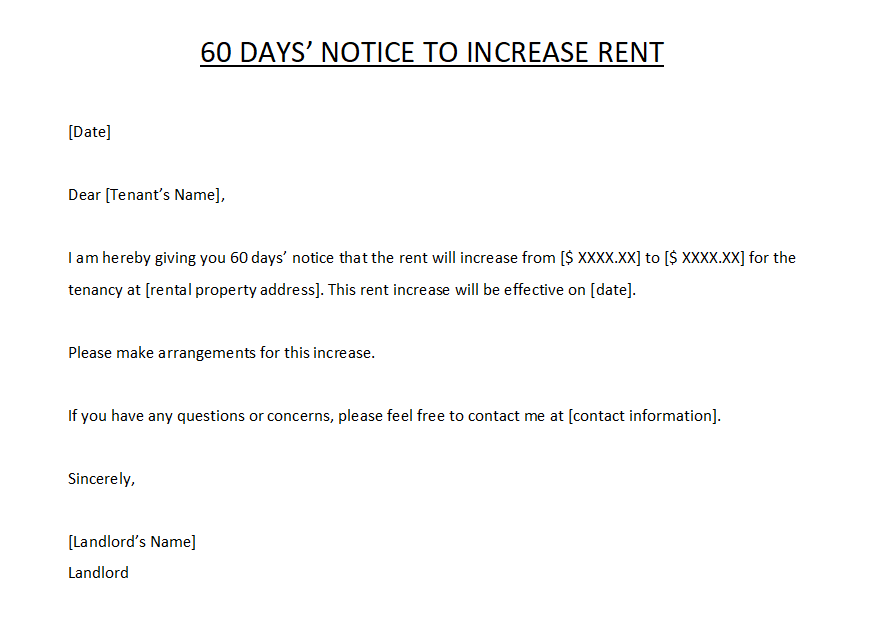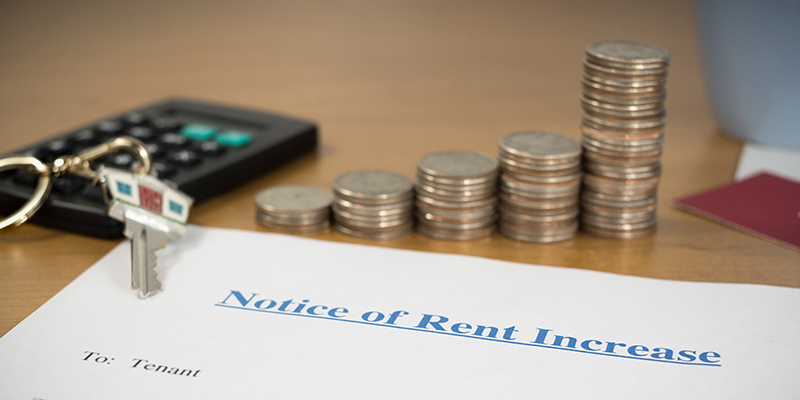Can landlords legally raise the rent? If they can, how high can they charge? Whether you’re a landlord or a tenant, it’s critical to know how to handle a rent increase.
Why Is a Rent Increase Even Necessary?
If a landlord made it out a year charging the same monthly rent, then why is there even a need to raise it? Why do landlords raise rent every year? Why do apartments raise rent every year? The answer is quite simple. Rent is how landlords make money, and they need to make sure there’s enough of it to cover property expenses.
There’s a lot that goes into managing a rental property. Landlords need to pay for mortgage payments, insurance, maintenance, repairs, utilities, and property taxes, too. If the property belongs in a homeowners association, then there are also HOA dues to pay for. Some landlords outsource their duties to a company or manager, so rent also needs to cover property management fees.
Because the cost of these expenses can go up every year, landlords need to adapt. Oftentimes, that means imposing a rental rate increase. If they don’t raise rent and their expenses continue to climb, they will lose out on making a profit. And isn’t rental property management just a business when it comes down to it?
Is It Legal to Raise Rent?
Now that you know why an increase is necessary, it’s time to find out whether or not landlords can even do so in the first place. Can a landlord raise rent fees? In a word, yes. Landlords do have the power to raise tenant rent, and it’s generally legal. There are some exceptions, though rental increase laws can differ from state to state.
Landlords and tenants should always refer to their lease agreements. The lease should contain language concerning a possible annual rent increase. Some agreements specify a maximum dollar amount, while others rely on a percentage every time the lease renews. Landlords should explain rental rate increase policies to their tenants upon move-in so as not to surprise them when it eventually rolls around. After all, not all tenants read their lease.
When Can a Rent Increase Take Place?
Both landlords and tenants should also know when the proper time is to increase rent. Landlords can’t just raise the rent on a whim, so when should they do it?
Can Landlord Raise Rent in the Middle of a Lease?
No, landlords can’t increase the rent while a fixed-term lease is still ongoing. For instance, if a tenant’s lease has a duration of six months, the landlord can’t raise rent three months into the lease.
Can Landlord Increase Rent After 1 Year?
It depends. If the lease has already ended, then the landlord can increase the rent provided they supply proper notice, follow lease agreement stipulations, and comply with state laws. Again, landlords can’t raise the rent mid-tenancy.
Can a Landlord Raise Rent If Another Person Moves In?
Lease agreements typically contain language that restricts having another person move in mid-lease. This is because the agreed-upon rent only covers the tenants the landlord initially signed off on. If another person moves in after the lease has expired, then the landlord and tenant will usually need to re-negotiate the rent. In this case, though, the landlord does have the power to raise the rent.
Do Landlords Need to Provide a Rent Increase Notice?
Landlords should provide their tenants with a written notice prior to the actual increase even if the lease agreement already stipulates it. It’s best to send this rent increase notice form to tenants via certified mail. This way, there is recorded proof that a tenant received the notice.
As for the notice period, landlords should refer to their state and local laws, as the requirement can vary from location to location. Most states require 30 or 60 days’ notice, while others require a certain amount of notice depending on the rental rate increase. For instance, in California, landlords must provide 90 days’ notice if they will raise the rent by 10 percent or more.
What does a rent increase letter to tenants look like? Here’s a sample:

Download Your Sample Notice to Increase Rent Here
Average Rent Increases
How much does rent go up yearly? The average annual rent increase rate is somewhere between 3 and 5 percent. Given this rate, that would mean an increase of $30 to $50 for a monthly rent of $1,000. To compute by how much rent will increase, simply follow the formula below:
Current Monthly Rent * Rent Increase Percentage = Amount of Increase to Monthly Rent
Taking the example above, the current monthly rent of $1,000 should be multiplied by 0.03 (3 percent in decimal form) to arrive at $30. If a landlord sets a fixed dollar amount as the rent increase, simply reverse engineer the equation to get the rent increase percentage. Follow the formula below:
(Amount of Increase to Monthly Rent / Current Monthly Rent) * 100 = Rent Increase Percentage
Applying this formula, the monthly rent increase amount of $30 should be divided by the current monthly rent of $1,000 to arrive at a quotient of 0.03. Then, multiply this by 100 to get a rent increase percentage of 3 percent.
Average Rent in the US
It’s worth noting that the average apartment rent can vary depending on the city and state. Nationally, though, a one-bedroom apartment costs around $1,060 per month, while a two-bedroom apartment costs around $1,315 per month.
The cheapest states to rent are West Virginia, Indiana, and Iowa, at $800, $862, and $892 per month, respectively. On the other side of the spectrum are New Jersey, Hawaii, and California, commanding a median rent of $1,700, $1,734, and $1,901, respectively.
What’s the Most a Landlord Can Raise Your Rent?
Generally speaking, there is no limit to how much a landlord can increase rent. If a landlord wishes to increase rent by 20 percent, they can certainly do so provided the lease specifies this and the tenant signed it. But, there are exceptions to this rule.
Some states have certain restrictions as to how much a landlord can raise the rent. If an apartment is rent-controlled or rent-stabilized, that usually means there is a cap on increases or an annual limit. Such laws are meant to protect tenants from unreasonable price hikes.
California recently passed a statewide rent control law known as Assembly Bill 1482. How much can a landlord raise the rent in California? According to the bill, landlords can’t increase rent by more than 5 percent, in addition to the local inflation rate, in a single year.
How much can a landlord raise the rent in NYC? Unlike California, New York doesn’t have a statewide law. But, on the bright side, many apartments in New York City are rent-stabilized. Because not all states have rent control or rent stabilization laws, landlords must do their own research to know if an apartment rent increase law applies to them.
Can Tenants Negotiate Rent Increase?
Tenants can try to negotiate the increase with their landlord, but success isn’t guaranteed. Some landlords are more amenable to negotiating, while others aren’t. How do you argue against rent increase?
First of all, it’s a good idea for tenants to be on their best behavior. Tenants should ask their landlords politely and try not to raise their voices. It also helps if they’re good tenants who pay rent on time and take care of the property.
Apartment hunting and the subsequent moving process can be a hassle, so if a tenant can afford it, it’s usually best to just pay the increase. If a tenant refuses to pay the reasonable and lawful increase in rent, they must move out once their lease expires. Failure to do so can lead to eviction or legal action.
But, a tenant does have the option to sue their landlord if they feel like the increase was an act of discrimination or revenge. Discriminating against a tenant is a violation of the Fair Housing Act, while retaliatory action is illegal in almost every state.
Ask for Upgrades
So you can’t get them to budge on the rent using either of the above techniques. Now it’s time for you to look for weaknesses in your apartment home. Does the carpet need replacing? Or maybe the counters in the kitchens are dated, or you have had to contact the landlord to repair the washer and dryer several times over the life of your lease.
Approach the landlord with your list in your hand. Politely show them the list. Explain that you understand that they aren’t open to maintaining the current rent amount. If they have to find a new renter, chances are they may have to replace equipment or upgrade appliances to remain competitive in the marketplace.
Explain that you will be open to paying the higher rent, and in return, you would appreciate the following upgrades in your apartment home.
They probably aren’t aware of the faults with the apartment and are thinking about the costs of having to replace or upgrade certain aspects of the home.
According to Rentkidz.com, some renters have been able to get new granite counters along with stainless steel appliances or even new carpet or flooring.
If none of the techniques work, then maybe it’s time for you to move on. That is what is so great about leasing. You can just pick up and move!
Final Words
Most tenants dread the very mention of a rent increase, but they should try to understand it from their landlord’s perspective. Managing a rental property isn’t easy and often costs a lot of money. As long as the increase is reasonable and within the law, there should be no problem with paying it.
Landlords can greatly benefit from the help of a property management company. Use Rental Choice’s online directory for a reliable company near you.
RELATED ARTICLES:
- Everything You Should Know About Rent Collecting
- How Do You Calculate Rental Income?
- How To Find Tenants That Are Reliable And Trustworthy




 Company
Company